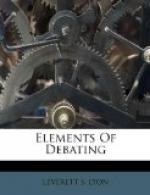all graft charges and made 100 per cent profits.
The Department of Finance, heretofore unable to
tell whether taxes were collected, is reorganized from
top to bottom. Through the glaring light
of publicity, the bureau collected more than a
million dollars for paving done at the public’s
expense between the street-car company’s rails.
The old conditions, where examination of the books
of any department involved weeks of labor, have
given way to a uniform system of public accounting.
In the words of the Springfield, Mass., Republican,
“The work of the Bureau of Public Research is
far more fundamental than the question of substituting
city organization with a commission.”
A fourth cause of evils is
that of state interference in purely
local affairs.
In the United States the city may not act except where authorized expressly and especially by the state. In Europe the city may do anything it is not forbidden to do, and municipal success there is based on this greater freedom. The European city, though subject to general state law, makes its own local laws, not in conflict with, but in addition to, state law. But in the United States the state legislature, accustomed to interfere in matters of interest to the state government, failed to distinguish between such matters and those of exclusive interest to the cities themselves. To illustrate: The Cleveland Municipal Association reported in 1900 that legislators from an outside county had introduced radical changes in almost every department of their city government. In Massachusetts the police, water works, and park systems are directly under the state, and the only part the cities have is to pay the bills. In Pennsylvania for thirty-one years the state kept upon the statute books an act imposing upon Philadelphia a self-perpetuating commission, appointed without reference to the city’s wishes, and with all power to erect a city hall and levy taxes to collect the twenty-million-dollar cost.
State and national political parties, controlling the legislature, have meddled in the private affairs of the city, resulting in the decay of the city council and the destruction of the local autonomy. Professor Goodnow says that under these conditions a scientific solution of the vexed question of municipal organization has been impossible.
The remedy lies in restoring to the city its proper field of legislation. Already thirty states have passed constitutional amendments granting greater legislative powers to the cities. Five states now allow cities to amend their own charters. But in direct opposition to this movement for municipal home rule, the commission form takes the last step in the destruction of the city’s legislative body and fosters continued state interference. President Eliot says that the functions of the commissioners will be defined and enumerated by the state.
Now, Honorable Judges, the basic principle




